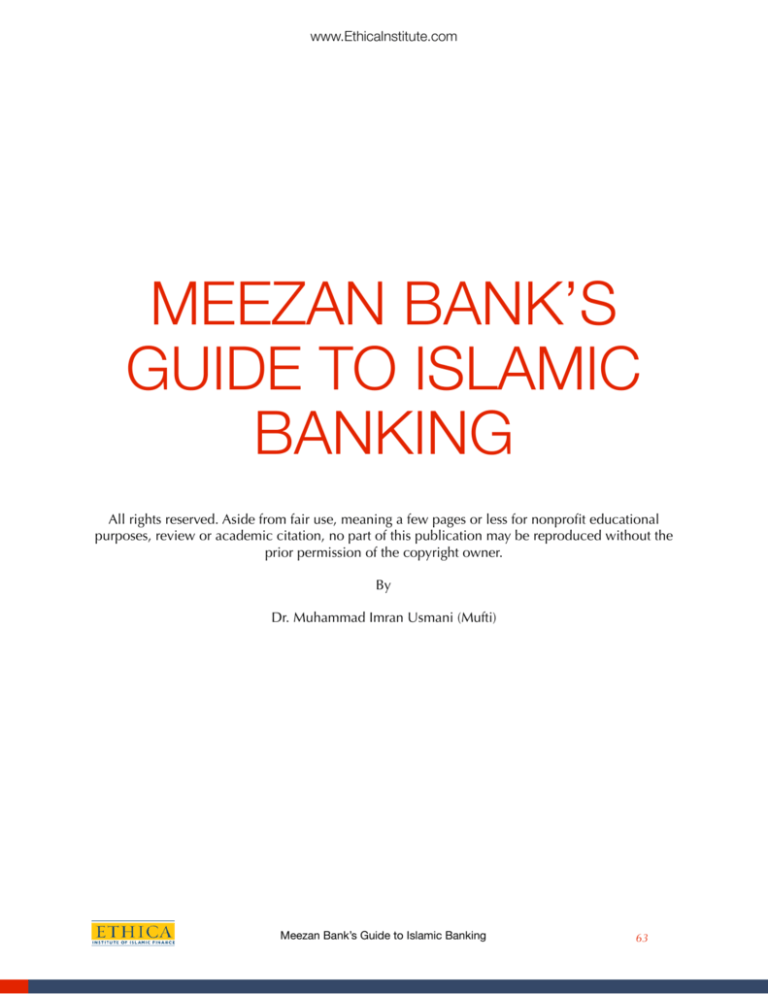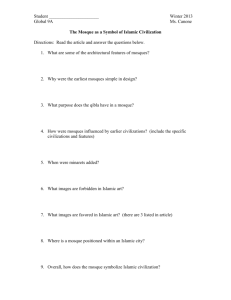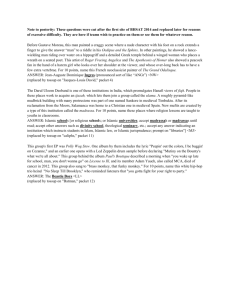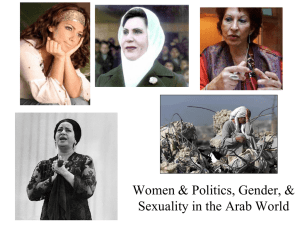
www.EthicaInstitute.com
MEEZAN BANK’S
GUIDE TO ISLAMIC
BANKING
All rights reserved. Aside from fair use, meaning a few pages or less for nonprofit educational
purposes, review or academic citation, no part of this publication may be reproduced without the
prior permission of the copyright owner.
By
Dr. Muhammad Imran Usmani (Mufti)
Meezan Bank’s Guide to Islamic Banking
63
www.EthicaInstitute.com
SECTION I: INTRODUCTION TO ISLAMIC ECONOMIC SYSTEM
Chapter 1: The Islamic Economic System
Chapter 2: Factors of Production in Islam
Chapter 3: The Objectives of the Distribution of Wealth in Islam
SECTION II: RIBA, ITS PROHIBITION AND CLASSIFICATIONS
Chapter 4: Riba in the Quran
Chapter 5: Riba in Hadith
Chapter 6: Riba and its Types
Chapter 7: Commercial Interest and Usury
Chapter 8: Simple and Compound Interest
SECTION III: ISLAMIC CONTRACT
Chapter 9: Islamic Contract
Chapter 10: Sale
Chapter 11: Valid Sale
Chapter 12: Five Khiyars
SECTION IV: ISLAMIC MODES OF FINANCING
Chapter 13: Musharakah
Chapter 14: Mudarabah
Chapter 15: Diminishing Musharakah
Chapter 16: Murabaha
Chapter 17: Salam
Chapter 18: Istisna
Chapter 19: Istijrar
Chapter 20: Ijarah (Leasing)
Chapter 21: Ijarah wa Iqtina
Meezan Bank’s Guide to Islamic Banking
64
www.EthicaInstitute.com
SECTION V: BANKING IN ISLAM
Chapter 22: The Features of a Conventional Bank
Chapter 23: Musharakah in Bank Deposits
SECTION VI: APPLICATIONS OF ISLAMIC FINANCING
Chapter 24: Project Financing
Chapter 25: Working Capital Financing
Chapter 26: Import Financing
Chapter 27: Export Financing
SECTION VII: ISLAMIC INVESTMENTS
Chapter 28: Securitization
Chapter 29: Islamic Investment Funds
Chapter 30: The Principle of Limited Liability
Meezan Bank’s Guide to Islamic Banking
65
www.EthicaInstitute.com
PREFACE
Today the world economic system, that is based on interest and has resulted in concentrating the
wealth in the hands of a selected few, creating monopolies and widening the gap between the rich
and the poor. In contrast, Islam encourages the circulation of wealth and regards its role as
important to an economy as the flow of blood to our human body. Just as clotting of blood paralyzes
the human body, concentration of wealth paralyzes the economy. The fact is that today the 10
richest men in the world have more wealth than the 48 poorest countries. Millions are
malnourished, lack access to safe water, cannot read or write and in short the quality of life has
decayed and the graph continues to go down.
Economic justice requires a viable economic system supported by an efficient banking system.
Interest based banking has proved to be inefficient as it fails to equitably distribute wealth which is
necessary for the well being of mankind. On the other hand Islamic banking is efficient and ensures
equitable distribution of wealth thus laying a foundation for an inflation free economy and socially
responsible banking.
The last few years have witnessed a dramatic increase in Islamic banking the world over. At least
two hundred Islamic banks and financial institutions have been set up. According to a research
report, the growth rate of these institutions is 15% per annum. At least two hundred billion US
dollars are invested in this system. Many multinational banks have opened Islamic banking windows
or subsidiaries of Islamic banking. The information on Islamic banking is also available in books,
CDs and websites in the form of database, multimedia directories, and encyclopedias.
On the Shariah side, there are a number of scholars on the Shariah boards of Islamic banks who
have compiled fatwas, resolutions and articles on various issues of Islamic banking and finance. In
Pakistan, we have at least two very comprehensive reports on Islamic banking system produced by
the Islamic Ideological Council 1980 and the Commission for Islamization of Economy in 1992.
Therefore Islamic banking is not a utopian idea. There is a need to develop insight and educate and
train bankers in the Islamic economic and banking system. Without having a deep understanding of
the principles of Islamic banking, it is difficult to offer products and services that conform to the true
spirit of Islamic law.
In July 1998, I joined Meezan Bank as a the Shariah Consultant with a vision to make the bank a
model Islamic bank. With the encouragement of Mr. Irfan Siddiqui, our Chief Executive Officer, I
carried out a comprehensive training course for the staff of the bank. The series of lectures included
topics such as the Islamic economic system, Riba, its prohibition and classifications, Islamic
contracts, Islamic modes of financing and their applications, banking in Islam and Islamic
investments. Various handouts related to the lectures were distributed to the participants of the
course that were mainly taken from my thesis on Musharakah, Mudarabah and Kitab-ul-Buyoo (rules
of Islamic Sale relevant to Islamic banking and finance). Some handouts were adapted from the
books and articles written by my respected father Maulana Mohammad Taqi Usmani. Our
participants of the course were of the view that these handouts and notes from my lectures should
Meezan Bank’s Guide to Islamic Banking
66
www.EthicaInstitute.com
be organized, edited and properly translated into English to develop a proper guide to Islamic
banking.
I am grateful to all the team members who helped me prepare this guide and gave me some very
good suggestions. I am especially grateful to our colleague Mrs. Zeenat Zubairi for assisting me
tirelessly in the translation work, editing and compilation of this project. I am also grateful to Mr.
Irfan Siddiqui and Mr. Pervez Said for not only participating in these lectures actively from the
inception but also encouraging us in the preparation of this guide.
We are Alhamdullillah running this course successfully at The Institute of Business Administration,
(IBA) Karachi. We have already trained two batches and now the third batch is getting its formal
education on Islamic banking.
In the end I pray to Allah Subhanahu Wa Tallah to accept our efforts in His cause, and give us the
guidance and ability for such humble efforts in future as well to free the world from Riba and revive
Islamic values all over the world. Ameen.
Imran Usmani
10 Moharram 1423
Meezan Bank’s Guide to Islamic Banking
67









